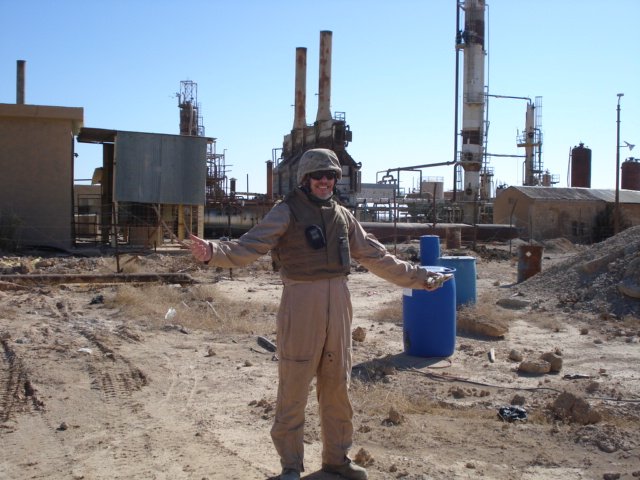Reposting article from an old blog. Oil shale.
We have more of it than anybody else; much of the rest lies under friendly places like Canada & Brazil. With new innovations it to be produced @$25/barrel w/o a big surface footprint AND it is extracted by injecting CO2 into sequestration right back where the oil came from. How elegant, efficient & perfectly balanced AND it is American. We have found the Tao of energy.
I am not an engineer, so those who know better please write me back and curb my enthusiasm, but let me summarize. Please listen to the whole thing and make your comments. The Q&A cleared up many of my doubts.
Oil shale is an old resource and extracting it is an old technology. Pioneers heading crossing the vast expanses of the west used the oil for axle grease and we all recall the oil shale related debacles such as Tea Pot Dome in the 1920s and the synfuels program of the late 1970s. Back in those days, there was no way to make the oil shale into useable fuel w/o an unacceptable ecological and economic cost. In 1980, they had to literally dig the shale out of the ground, release the oil with lots of water, then dump the slag all over the previously verdant hills and the dirtywater into the heretofore pristine rivers of the Rocky Mountains. We can all be grateful that synfuels crashed and nothing burned.
Why have we not used oil shale before?
We tried. We did. It used to cost too much and make too much of a mess, but new technologies allow the liquefaction of the oil below ground, producing no slag and requiring no water, AND it requires the injection of CO2. The CO2 stays down there were the oil was. It is more environmentally benign than almost any other extraction method because it not only extracts cleanly, but it also sequesters CO2. Maybe we could even sink more than we bring up.
The other big problem was/is price. Price volatility has always been a problem in an industry where investments must be made based on price estimates 5-7+ years from today. Middle Eastern oil is almost free. There was (and remains) no way that oil shale can compete with oil from the Middle East when they are pumping flat out. There is still the danger that the sheiks, despots, potentates and dictators who control so much of the world’s exportable oil will open the pumps to kill innovations in oil shale before it gets off the ground. Oil shale needs minimum prices about $25/barrel. Big oil producers with lots of fixed cost capacity can undercut that anytime they want. It would not be the first time and the dirty business actually wins them accolades from consumers.
How can we avoid this fate? Keeping the price of oil artificially high is nearly impossible over any long periods of time (and imagine the political problem is high prices became U.S. policy) and it takes only a short time for low prices to destroy alternative investments. It happened in the 1990s and it can happen again. The author suggests a simple expedient. President Bush wants to fill the strategic oil reserve. Why not commit to fill it with oil produced from oil shale. This will provide a market floor to the shale and insure that investments made are not too risky. Once the infrastructure is in place, we can tell those foreign potentates to go to hell, as shale oil can free us from foreign oil for a generation – long enough for us to develop viable alternatives to hydrocarbons.
Here is some more background on oil shale from Rand and a CRS report on oil shale. The Rand report is mildly critical. The author addressed some of the concerns, BTW. Some general industry background on oil shale is here.
Posted by Jack at March 9, 2007 5:30 PM
CommentsComment #211249
Jack, I’ve mentioned this before but I’ve heard an extremely interesting lecture given by a professor Albert Bartlett about energy use and the coming crisis. It is relevant to issues like oil shale development and ethynol production. Neither one is viable from what I have heard, (although I will read the links you have provided). Canada produces @ a million barrels a day from oil shale but it is economical only because they are using on-site natural gas in the process, gas that would otherwise go to waste. It costs energy to produce energy. This equation has nothing to do with the price we pay retail, even if we were able and willing to pay $10 a gallon for fuel produced from shale, if it costs 1.1 units of energy to extract 1 unit net, it’s going to stay in the ground.
Also, estimates in number of years of supply from a given source invariably assumes no growth in demand; very unrealistic.Posted by: charles Ross at March 9, 2007 6:33 PMComment #211253
Charles
I think if we do not subsidize it (but give it that floor to protect from wild swings) the market will sort out whether or not it is viable re inputs.
I really do not know. It seemed too good to be true and such things often are. Listen to the lecture. He updates some of the info in the articles. He is talking about a new developing technologies.Posted by: Jack at March 9, 2007 6:41 PMComment #211263
More good reason for a tariff on imported oil to keep the price at about 60$ a barrel. I think it would be a politically viable plan as energy independance is important for geopolitical reasons.
I would rater see the SPR used like the Federal Reservedoes to control inflation. They buy heavily when prices fall and sell heavily when prices inflate.Stability is the key to any alternate industry capitalization. The Saudis have already said they are willing to drop oil prices to fend off alternatives. Our friends.
PS Denmark is getting half their power now from offshore wind. Tidal pumping is getting big in Scotland etc. .Posted by: BillS at March 9, 2007 7:59 PMComment #211394
If we can get enough of our own oil out of the ground to tell the Arabs to shove theirs where the sun don’t shine I’m all for it.
But wouldn’t $25 a barrel compared to $65 a barrel lower gas prices? And sense your for high gas prices why are you for this?Posted by: Ron Brown at March 10, 2007 8:09 PMComment #211402
Oil shale? call me ignorant but that is rock right? Well I guess if you can get it through the hose, y’know..(Second thought, call me beligerant)
self serve shovels? Shale gas station?
Maybe the future is firewood—we got all these damn trees, right? Call Rand about all these freakin’ trees we found.Posted by: Servitudinal at March 10, 2007 9:16 PMComment #211404
Why do republicans hate the bio-deisel idea so much?—is it the messenger (dems)? Or the influential big-oil dinars that flow so rapidly into the RNC warchest that gears you off in such directions? Thine own holy-cow partyline are thine own nemesis.
A year or so back there were a group of highschool kids that created a GTO that ran on refined soy fuel I recall reading. It can be done.Posted by: Servitudinal at March 10, 2007 9:27 PMComment #211406
Another idea—genetically modify insects to give off highly flamable bug-sh*t. Let’s face it thirty years from now we’re friggin’ Amish with the way the two parties are going, I don’t see any avenues of greater advent in the way of motor or energy resource technology.Posted by: Trident at March 10, 2007 9:48 PMComment #211424
Generally, you have to strip mine shale so I’m not sure how viable this will be. Virginia has plenty of shale, Jack. Perhaps you’d like to donate your wooded estate for a good cause. 🙂
Seriously, I’d rather use the natural gas to provide relatively clean power than to extract carbon-rich (i.e. – dirty) petroleum.Posted by: American Pundit at March 11, 2007 12:04 AMComment #211428
AP
Listen to the talk. That is the big innovation. Back in 1980 you had to bring the shale to the surface. That is what made the big mess. The new system extracts the oil underground AND injects CO2, which sequesters it right when the oil came from. That is what is so interesting.
Presumably if there was oil shale under my working forest, they could extract it w/o significant damage and I could make more money than Jed Clampet. That is not my business, however. My land grows trees and provides wood, clean water, fresh air and wildlife habitat. People really should appreciate tree farmers more.Posted by: Jack at March 11, 2007 12:34 AMComment #211484
Jack,
your story about the Alberta oil shale and sands is appropriate and timely. As you state correctly, making crude out of shale is nothing new but the economics of the process have always been very unattractive in competition with the exploitation of conventional till recently.
Although I have an engineering background one does not have to be a petroleum engineer to understand the basics of the shale oil or oil sands process to appreciate the industry’s challenges.
It’s my understanding that CO2 has been used in the past as a pressurizing agent to bring oil to the surface, but it’s not the only one. But sequestration is a different issue entirely, as I understand it, because it either needs to bind itself, chemically to some subterranean substance, or it gets stored far below the surface in a salt dome or similar cavity.
These are expensive operations and together with water treatment and waste treatment adds major costs to the process.
But I think you are on the money with a price of $25-30/barrel of crude as a bottom cost to make shale and sand oil economic.
My view about the projected crude oil cost/barrel is that the demand for oil will continue to increase at a good rate, mostly due to China and India growing so rapidly. And since economic development is critically coupled to the cost and availability of energy I see no reason that the cost of oil will drop by anything more than 20 or 25% and then only if we have a serious depression.
The world has enormous remaining reserves of oil but they will not do anybody any good if they cannot be developed because of overly strict or ill conceived environmental constraints. It is really time for the USA to develop the ANWAR deposits more aggressively together with multiple continental shelf options available right now.
FredPosted by: Fred Engel at March 11, 2007 4:32 PMComment #211539
Oil shale — it is too good to be true.
One, the CO2 used does not counterbalance the carbon removed. If the literature is correct, the replacement occurs at around a 1:2 ratio.
Two, Engel brings up the more serious problem (presuming one is interested in reducing atmospheric carbon)—sequestration. The CO2 will slowly rise to ground surface and be released into the atmosphere.
Three, the costs (including energy consumption) required for the industrial production, transportation, and use of CO2 are quite sizeable.
Four, the costs of making oil shale extraction financially viable from a business perspective are not small and would be better invested in the development of non-fossil fuels technologies which can produce more efficient fuels with fewer negative consequences for the atmosphere.
I installed solar panels on my home 4-1/2 years ago. They provide 100% of the electrical power for my all-electric home (with a heat pump for heating & cooling). I broke even at the 3-1/2 year point even though living in Chicago which is not known for an over abundance of sunlight. Of the many benefits, not getting a monthly electric bill is my favorite.Posted by: Allen at March 12, 2007 10:53 AMComment #211717
The CEO of JetBlue has asked that government place a floor on oil, at which point a subsidy would kick in to prevent OPEC from undercutting coal and driving it out of business, as they did once before. That makes more sense that subsidizing farmers to grow corn and grass to inefficiently make ethanol. We have enough coal reserves to satisfy our needs. Why not?Posted by: Clay Barham at March 13, 2007 12:49 PMComment #211942
Clay,
I certainly agree with you that we should encourage the use of more coal, clean coal that is, slurry and hi-temp combustion, but more importantly we should take the clamps off drilling for more oil in North America, anywhere, and go all out on natural gas and nuclear energy plants. That would transfer a large part of our energy use to electric from particularly oil. What will it take for the country to start doing that very soon? More clear thinking, strong character politicians?
FredPosted by: Fred Engel at March 14, 2007 1:31 PMComment #211964
Fred,
The environmental impact of oil exploration for extremely narrow returns is why not.
jack,
I read up on the shale oil / syncrude plan. It looks like a push by Shell to get corporate welfare to pony up on some far off scheme with a questionable 10+ year ROI. Since big oil and Bush Co has the credibility of Tommy Flanagan, I’ll wait a few years until a truly unbiased and respectable opinion develops.Posted by: Dave1-20-2009 at March 14, 2007 3:40 PMComment #212066
Jack,
I can’t quite see it your way and do not consider our modern oil companies as willfully polluting the environment. Some foreign firms is a different kettle of fish. As a matter of fact, the upstream part of the industry is very localized (for instance, at ANWAR they want the equivalent of 2 acres out of 1500 for their drilling and storage activities with everybody looking over rtheir shoulders)but pipelines are vulnerable and downstream refineries occasionally have accidents. Which industry doesn’t have bad days? Furthermore, looking over their annual reports, they are neither undercapitalized nor typically marginal players. Returns are good. What they cannot control is market process, that’s another organization’s privilege.In my view there is no good reason to go slow on the production and use of oil as long as it can we made a readily available. After all, can you think of any other energy source as practical as a gallon of gasoline or diesel fuel?
I am all for growing parallel energy sources and products but carbohydrates will be hard to beat for a long time.
FredPosted by: Fred at March 15, 2007 9:06 AMComment #212089
Fred,
Sorry for not being thorough. I was not talking profit when I said returns. I meant that my current understanding is the maximum ANWR extraction rate would be pretty small in terms of our overall usage and the environmental impact would huge (e.g Prudhoe had an average reported spill rate of more than one spill a day and the required seismic testing just to verify 10+ year old studies is permanently damaging to the tundra by itself). Saying “bad days” for disasters that impact local conditions for years is unbecoming.Posted by: Dave1-20-2009 at March 15, 2007 1:04 PMComment #212328
Dave, thanks for your response.
I looked over my own notes and some relevant references (the latest from 2005) and came up with the following:
Alaska produced 315 million barrels of crude that year, or about 860,000 gallons per day. The USA used approximately 20 million gallons per day in toto,two third of which is imported from all kinds of places and total domestic production was about 5 million barrels including Alaska. Hence today, Alaska produces about 4% of our national requirements. But opening the ANWR area judiciously would raise that amount to about 8%, so it’s certainly very worthwhile.
The big stumbling block about ANWR is the concern by environmentalists that the whole ANWR area would be affected. That is patently just not so. The total ANWR area is about, 1,500,000 acres. The oil companies have asked permission for operations in a very small area of 2000 acres, that is the equivalent of 2 acres out of 1500. I do not see that as a problem but some people just don’t want any oil drilling at all. But they do expect somebody to find enough oil to keep their local pumps supplied. Oil, like evrything else that isn’t fruits or nuts, doesn’t grow on trees.
One has to find it and drill holes.
I am sympathetic with anyone’s concern about the environment but people do make a mistake now and then, usually not deliberately either. Sometimes they even lose their lives, like 40,000 people annually lose their lives in car accidents, certainly not deliberately. That’s why I always have a problem with self righteous people immediately claiming conspiracies, malicious intent, careless behavior etc. etc. Nevertheless, none of that should stand in the way of utilizing the earth’s resources in a responsible manner to support our and any other country and its people in a long term attempt to try to see if we can live more humanely together and more so than other societies in the past. But I’m getting off the subject.
As far as oil spills are concerned, I am aware of 3 substantial ones over the past 15 years as far as Alaska is concerned, of which the Exxon Valdez of course was by far the largest. Two of these accidents had nothing to do with oil exploration or processing, or Alaska as far as I remember. The third one was a leak in a pipeline that wasn’t noticed for 5 days. Now that upsets me, because as a former engineer that shows a failure in maintenance procedures and for that a head should roll. But even that is no reason to condemn the use of carbohydrates.
I do not know where one spill/day at Prudhoe Bay comes from but if a gasket is changed in a pipeline or a valve is replaced at a tank and spills 30 or 40 gallons of crude in the process I would call that maintenance and certainly not an oil spill in the same category as accidents. Any more than you would call dropping some gasoline from the hose when you fill your tank is an ecological disaster. In my opinion it is necessary for us to maintain our common sense about things.
But whether we like it or not, we do need more oil and lots of it while it will give us the time to develop better and even more ecologically responsible, energy sources. If we lose the energy supply race our whole country will go down the tubes and not just the USA.
Posted by: Fred at March 16, 2007 2:38 PM




